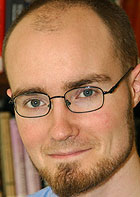When third-year medical student James Hudspeth spent a few months in 2004 in a clinic in Johannesburg, South Africa, he saw many patients with end-stage AIDS: wheelchair-bound, wasting away and with the purple spots of Kaposi’s sarcoma.
A limited number of people with AIDS in Africa were just beginning to receive antiretroviral medications — the standard therapy for AIDS in the United States for the past 10 years.

Instead of discouraging Hudspeth, the enormity of the AIDS crisis in Africa motivated him to return, which he will do in July on a fellowship from the Fogarty International Center/Ellison Medication Foundation.
“I saw the potential impact of HIV/AIDS and how far we need to go,” Hudspeth said.
The fellowship will enable Hudspeth to spend a year at the University of Natal in Durban, South Africa, assisting in clinical research on HIV/AIDS and shadowing physicians caring for patients.
Hudspeth, who is interested in infectious diseases, international health and clinical research, said he believes the yearlong fellowship will help him decide which facet he should focus on in his career.
“I think it will have a huge impact on who I’ll become as a doctor,” Hudspeth said. “I’m grateful to Gary Weil, M.D., and Leslie Kahl, M.D., for their support in helping me with this.”
Weil, professor of medicine, said Hudspeth is an outstanding medical student with good leadership skills.
“And on a personal level, James is a serious young man who is idealistic but mature,” he said. “He has a precocious insight into challenges and realities regarding international infectious disease research and work, especially in the area of HIV/AIDS.”
Hudspeth, whose father is a neurobiologist at Rockefeller University and whose mother is a pediatric neurologist at Cornell University, spent most of his childhood in New York City. While attending Columbia University, he decided he wanted to become a physician.
In his first year at the School of Medicine, Hudspeth became interested in the impact of the 2004 campaign on HIV/AIDS funding during a trip to the Iowa caucuses.
Hudspeth became regional and then national coordinator for the American Medical Student Association’s AIDS Network. In medical school, he has also been involved in Physicians for Human Rights, Students Teaching AIDS to Students, the Saturday Neighborhood Health Center and the Gay-Straight Alliance.
He was selected by his medical school classmates to receive the Class of 2001 Award, given on the basis of “achievements outside the classroom.”
“James is an extraordinary giver,” said Kahl, professor of medicine and associate dean for student affairs. “He has been deeply immersed in what must be a record number of our student-run community-service programs and projects and has shouldered leadership positions in a number of these organizations. And he shows uncommon initiative, imagination and follow-through.”